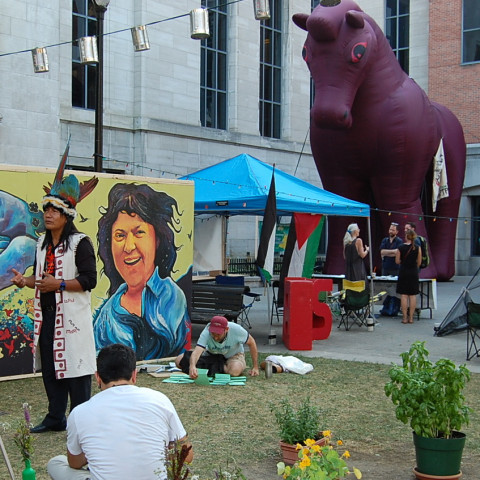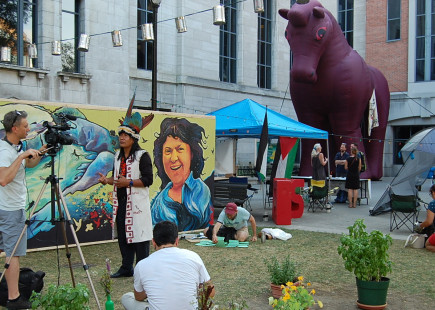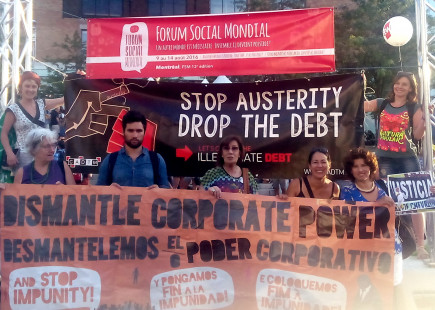TNI helped to bring together many groups and movements during the 15th World Social Forum (WSF) in Montreal. Groups and movements who share a vision of people’s sovereignty, energy democracy and progressive public services, and who struggle against corporate power, free trade and extractivism came together to exchange ideas. The event was sadly marred by the Canadian government's refusal to issue visas to a massive number of delegates, robbing proceedings of significant perspectives, particularly from the Global South. TNI worked at a wide range of events including workshops on Energy Democracy and Remunicipalisation in Public Services, and the Global Campaign to Reclaim People's Sovereignty, Dismantle Corporate Power and Stop Impunity.
The start of the 2016 World Social Forum - a platform that originated in the 2001 counter-hegemonic globalisation movements meeting in Porto Alegre - was overshadowed by the absence of at least 70 percent of the delegates, who had been denied temporary visas. The government cited reasons such as insufficient financial resources and doubts as to whether applicants intended to leave Canada after the WSF. TNI joined protests and supported the demands of dozens of organisations to remedy the situation.
Among the rejected applicants was Aminata Traoré, former minister of tourism and culture in Mali and candidate to succeed Ban Ki-moon as Secretary General of the United Nations. The Canadian government excluded partners and friends of TNI and many other groups and organisations, many of whom have been adversely affected by the activities of transnational corporations (TNCs). Their valuable contributions were sorely missed.
Most TNI activities at WSF centred on the convergence space “People and Planet before Profit. Moving away from Free Trade and Extractivism to Dismantle Corporate Power”, which was endorsed by more than 100 global, regional and national networks and organisations. As part of the World Social Forum the space provided an opportunity for groups and movements that work against extractivism and for social justice, against Free Trade and Investment Agreements and for progressive public alternatives, against unmitigated corporate power and for climate justice. The groups meeting in the convergence space built momentum and strengthened coordination among front-line, direct, non-violent and anti-systemic actions. The space brought thousands of participants together for over one hundred activities.
The Global Campaign workshop was attended by more than 100 participants. The “People and Planet before Profit” space and the “Dismantle Corporate Power” workshops provided open and energetic space where the struggles of several members of the Campaign were shared: the Movement of People Affected by Dams - La Via Campesina (MAB-Brazil), the Union of People Affected by Chevron Texaco (UDAPT), Attac Argentina-CADTM, Stop the Wall, Focus on the Global South, Ecologistas en Acción, Polaris Institute, CETIM, Attac Spain, Corporate Accountability International, and others. Participants also heard updates about the Southern Africa Permanent Peoples Tribunal on Transnational Corporations.
TNI’s Mónica Vargas shared updates from the Global Campaign's calendar; the current work of the working groups (Peoples Centre on TNC impunity, Privatisation of Democracy, Communication) and the upcoming Week of Mobilisation on 24-29th October 2016 in Geneva. The mobilisation will be at the occasion of the Second Session of the Open Ended Inter-Governmental Working Group (OEIGWG) at the Human Rights Council, mandated to establish a Binding Treaty on Transnational Corporations.
Brid Brennan updated on the Global Campaign analysis on the architecture of corporate impunity and the proposals raising from its members such as the International Peoples Treaty.







